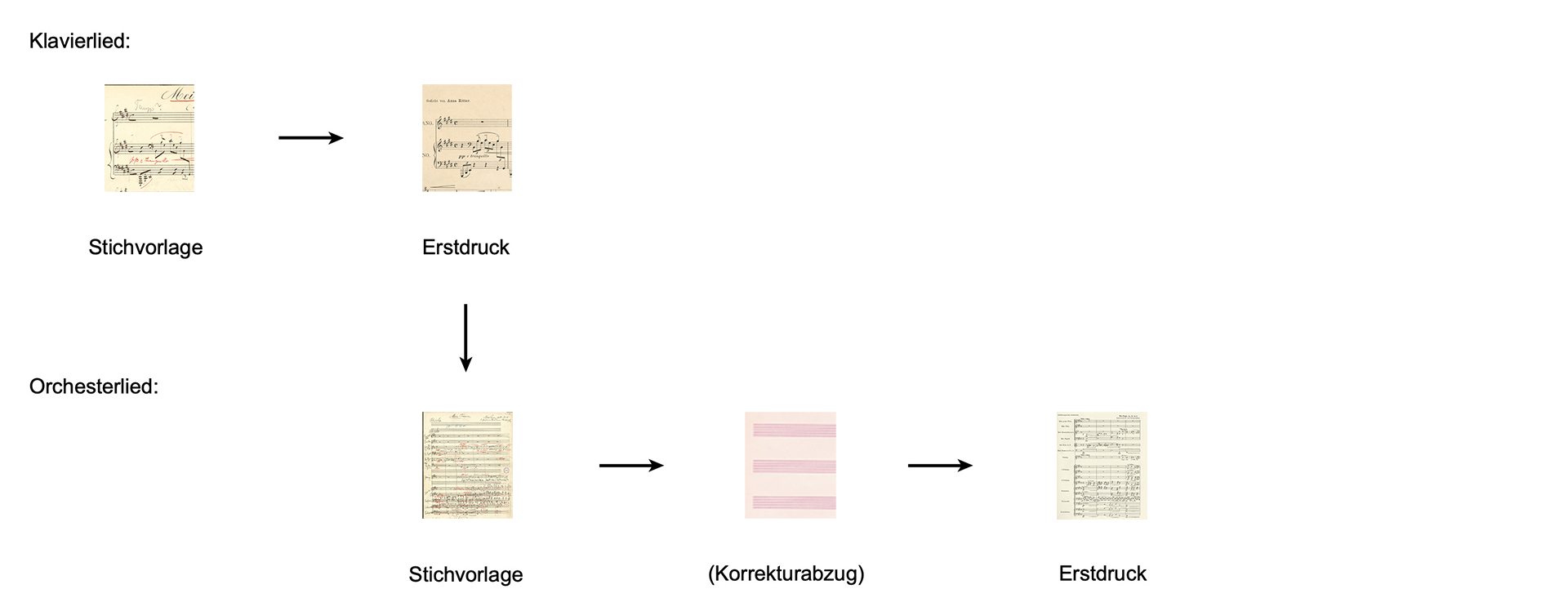Mein Traum op. 31 No. 5
Version for medium voice and orchestra
-
Mein Traum
Text: Anna Ritter
- –
- Six Poems by Anna Ritter op. 31 for medium voice and piano
- –
1.
| Reger-Werkausgabe | Bd. II/6: Lieder mit Orchesterbegleitung, S. 140–151. |
| Herausgeber | Christopher Grafschmidt, Claudia Seidl. Unter Mitarbeit von Knud Breyer und Stefan König. |
| Verlag | Carus-Verlag, Stuttgart; Verlagsnummer: CV 52.813. |
| Erscheinungsdatum | September 2023. |
| Notensatz | Carus-Verlag, Stuttgart. |
| Copyright | 2023 by Carus-Verlag, Stuttgart and Max-Reger-Institut, Karlsruhe – CV 52.813. Vervielfältigungen jeglicher Art sind gesetzlich verboten. / Any unauthorized reproduction is prohibited by law. Alle Rechte vorbehalten. / All rights reserved. |
| ISMN | 979-0-007-30199-6. |
| ISBN | 978-3-89948-446-5. |
Mein Traum
Anna Ritter: Mein Traum, in:
ead.: Gedichte, Verlag von A. G. Liebeskind, Leipzig
First edition
Used for comparison purposes in RWA: Anna Ritter: Mein Traum, in:
ead.: Gedichte, 5th edition, J. G. Cotta’sche Buchhandlung Nachfolger, Stuttgart
Copy shown in RWA: DE, Karlsruhe, Max-Reger-Institut/Elsa-Reger-Stiftung.
1. Genesis
Publication
At the same time that he was working on his Mariä Wiegenlied, Reger also wrote to Universal-Edition in Vienna, which was the legal successor of the Aibl publishing house, offering “to orchestrate some of my songs that have been published by your company”. He also asked “for your suggestions”. (Letter of 29 April 1915) By the time that Universal signalled its agreement just two weeks later, Reger had “already orchestrated 5 of these songs”. In this case, too, he placed importance on a straightforward orchestral setting, emphasising that “they can even be performed without a voice. It is extraordinarily important to me that these 5 songs should appear in print as soon as possible in my orchestration. I therefore request most urgently that when I send you the manuscripts of these 5 songs (orchestrated) in the near future, you should immediately have them engraved, so that they might appear as soon as possible.” Reger justified his selection by explaining that he had “already, countless times, experienced for myself the impact of these 5 songs on the broad mass of the public”. In the event that Universal should have other ideas, he added that they could “publish a few more songs, orchestrated by me, at a later date”. (Letter of 10 Mai 1915)
Universal-Edition accepted his selection of songs, and Reger sent them the engraver’s copies on 19 May 1915. He also took this opportunity to repeat his proposal to “orchestrate 2 more songs in addition (of your choice!)”, and again emphasised that he was “extraordinarily” concerned that these arrangements should be published as soon as possible. (Letter of 19 Mai 1915)1 Universal then made certain demands – perhaps in connection with the performance rights or the copyright – that Reger was unwilling to fulfil: “I regret very much that I can not waive my rights, and request that you return to me the manuscript scores of the 5 songs I have orchestrated immediately [underlined four times] by registered mail! Needless to say, I hereby renounce for all time any possible business relationship with Universal-Edition.” (Registered letter of 2 June 1915) The publisher now clearly retracted its demands: “These rights that you have granted me here are rights that every German publisher would immediately grant me without further ado! I am delighted that that you are receptive to my orchestrations. I hope to get the proofs soon.” (Postcard of 8 June 1915) However, the proofs did not reach him until February 1916, “regrettably half a year too late! I am always on concert tours this winter, so with the best will in the world, I shall only be able to check through these proofs in the spring!” (Postcard of 12 February 1916)
On 5 May, Reger returned the corrected proofs together with the manuscripts. No information is extant about the actual date of publication of the first editions. The copyright notice gives the year 1916, and the collective title page bears the remark: “The composer completed the orchestration of these songs in 1916 and declared the proofs ready for publication a few days before he passed away”.
2.
Translation by Chris Walton.
1. Reception
At present, there are no records of performances in Reger's time.
1. Stemma

2. Quellenbewertung
Der Edition liegt als Leitquelle der Erstdruck zugrunde. Als Referenzquelle wurde dessen Stichvorlage herangezogen, in einigen Fällen auch der Erstdruck des Klavierlieds sowie dessen Stichvorlage, die Reger zum Zeitpunkt der Bearbeitung jedoch nicht vorlag.
3. Sources
- Stichvorlage (KL-SV)
- Erstdruck (KL-ED)
- Stichvorlage (OL-SV)
- Erstdruck (OL-ED)
Object reference
Max Reger: Mein Traum op. 31 No. 5, in: Reger-Werkausgabe, www.reger-werkausgabe.de/mri_work_01074.html, version 4.0, 18th December 2025.
Information
This is an object entry from the RWA encyclopaedia. Links and references to other objects within the encyclopaedia are currently not all active. These will be successively activated.